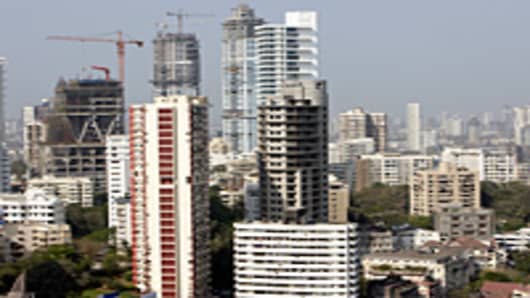A 28th floor apartment in south Mumbai, facing the Arabian Sea, sold for a record-setting 390 million rupees ($6.8 million) this month, underscoring the dichotomy in India’s property market where prices remain stubbornly high, even as the economy falters and the currency nosedives.
Mumbai, India’s financial hub and home to Bollywood-- one of the largest movie industries in the world -- is the most expensive city in the country and real estate prices in the city compete with other Asian centers such as Singapore and Hong Kong.
Over the past year Asia’s third-largest economy has grappled with corruption scandals, policy flip fopsand poor fiscal performance, but property prices in its largest metro have stayed immune, clinging to pre-Lehman highs.
Anuj Puri, Country Head (India) at real estate services firm Jones Lang LaSalle, says prices will remain at these levels and he doesn’t foresee a decline any time soon.
According to industry estimates, property prices in Mumbai rose about 17 percent in the first quarter of this year. A combination of a lack of supply, regulatory hurdles that have come in the way of new launches and an inflexible lease market have all contributed to the city’s sky-high prices.
“Apartments are not easily available for rent in Mumbai to individuals, as owners prefer to lease only to corporates, therefore people look to buy a house,” says Rajesh Jogani, a property investor in Mumbai.
But high mortgage rates, which are between 10 percent and 12 percent, have created a cash crunch for buyers resulting in a dip in volumes. According to industry estimates, sales are down by more than 40 percent over the past one year.
“Demand has slowed, but supply has slowed even faster,” says Puri, adding that the approval of new projects over the past 14 months has been very slow as the government was in the middle of changing regulations. Even though the new rules are now in place it will take at least another four years before fresh supply can hit the ground, he says.
This tightness in supply has given existing property owners greater bargaining power. “If you have holding power and can wait it out for a few months, you are sure to get a good price,” says Jogani, who got 20 percent more than his asking price for his apartment in central Mumbai after waiting it out for six to eight months.
“If earlier there were 10 buyers for one apartment in Mumbai, now there are 5, but they are still there,” says Puri.
Bharat Shah, whose company, the Siddharth Group, has been building homes in Mumbai and its suburbs since 1990, says the high cost of acquiring land, owing in part to the fact that Mumbai is an island, plus the increasing cost of construction prevents builders from cutting prices.
“We can’t afford to lower prices,” he says. “People have waited to buy and realized prices have not come down, so we expect volumes to pick up in the coming months.”
According to Ramesh Jogani, the CEO of real estate private equity firm India Reit, the undertone is still bullish because the market is largely made up of Indians looking to own a home. Regulations in India restrict ownership by foreign individuals.
“The buyers are more genuine homeowners and less speculators,” says Jogani, whose firm has raised 31 billion rupees ($540 million) to invest in the Indian property market since it started in 2006.
“We recently launched a fund that was looking to invest in redeveloping old Mumbai buildings and slum areas and we raised 2.5 billion rupees ($43 million) in just two months,” Jogani said, highlighting investor confidence in Mumbai’s property sector.



